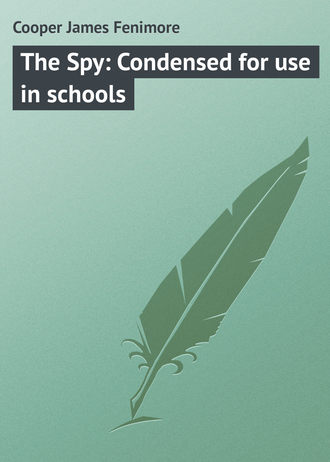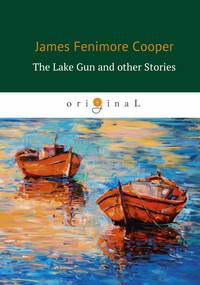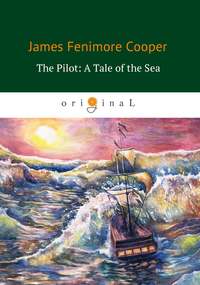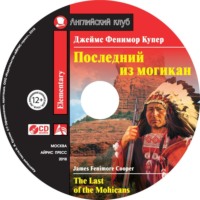
The Spy: Condensed for use in schools
The old man listened to each word as it was uttered, with the most intense interest; but, toward the conclusion of the dialogue, the earnest attention of his countenance changed to a kind of inward smile. Mason paid but little attention to the expression of his features, and continued:
“To me she is selfishness embodied.”
“Her selfishness does but little harm,” returned Dunwoodie. “One of her greatest difficulties is her aversion to the blacks. She says that she never saw but one that she liked.”
“And who was he?”
“His name was Cæsar; he was a house-servant of my late grandfather Wharton. My mother always speaks of him with great affection. Both Cæsar and Katy came to Virginia with my mother when she married. My mother was – ”
“An angel!” interrupted the old man, in a voice that startled the young soldiers by its abruptness and energy.
“Did you know her?” cried the son, with a glow of pleasure on his cheek.
The reply of the stranger was interrupted by sudden and heavy explosions of artillery, which were immediately followed by continued volleys of small-arms, and in a few minutes the air was filled with the tumult of a warm and well-contested battle.
Everything in the American camp announced an approaching struggle. The troops were in motion, and a movement made to support the division of the army which was already engaged. Night had set in before the reserve and irregulars reached the foot of Lundy’s Lane,140 a road that diverged from the river and crossed a conical eminence at no great distance from the Niagara highway. The summit of the hill was crowned with the cannon of the British, and in the flat beneath was the remnant of Scott’s141 gallant brigade, which for a long time had held an unequal contest with distinguished bravery. A new line was interposed, and one column of the Americans directed to charge the hill, parallel to the road. This column took the English in flank, and bayoneting their artillerists, gained possession of the cannon. They were immediately joined by their comrades, and the enemy was swept from the hill.
But large reënforcements were joining the English general momentarily, and their troops were too brave to rest easy under defeat. Repeated and bloody charges were made to recover the guns, but in all they were repulsed with slaughter. During the last of these struggles, the ardor of the youthful captain whom we have mentioned urged him to lead his men some distance in advance, to scatter a daring party of the enemy. He succeeded, but in returning to the line missed his lieutenant from the station that he ought to have occupied. Soon after this repulse, which was the last, orders were given to the shattered troops to return to the camp. The British were nowhere to be seen, and preparations were made to take in such of the wounded as could be moved.
At this moment Wharton Dunwoodie, impelled by affection for his friend, seized a lighted fusee,142 and taking two of his men, went himself in quest of his body, where he was supposed to have fallen.
Mason was found on the side of the hill, seated with great composure, but unable to walk from a fractured leg. Dunwoodie saw and flew to the side of his comrade, exclaiming:
“Ah! dear Tom, I knew I should find you the nearest man to the enemy.”
“Softly, softly; handle me tenderly,” replied the lieutenant. “No; there is a brave fellow still nearer than myself, and who he can be I know not. He rushed out of our smoke, near my platoon, to make a prisoner or some such thing, but, poor fellow, he never came back; there he lies just over the hillock. I have spoken to him several times, but I fancy he is past answering.”
Dunwoodie went to the spot, and to his astonishment beheld the stranger.
“It is the old man who knew my father and mother,” cried the youth; “for their sake he shall have honorable burial. Lift him, and let him be carried in; his bones shall rest on native soil.”
The men approached to obey. He was lying on his back, with his face exposed to the glaring light of the fusee; his eyes were closed, as if in slumber; his lips, sunken with years, were slightly moved from their position, but it seemed more like a smile than a convulsion which had caused the change. A soldier’s musket lay near him; his hands were pressed upon his breast, and one of them contained a substance that glittered like silver. Dunwoodie stooped, and moving the limbs, perceived the place where the bullet had found a passage to his heart. The subject of his last care was a tin box, through which the fatal lead had gone; and the dying moments of the old man must have been passed in drawing it from his bosom. Dunwoodie opened it, and found a paper in which, to his astonishment, he read the following:
“Circumstances of political importance, which involve the lives and fortunes of many, have hitherto kept secret what this paper now reveals. Harvey Birch has for years been a faithful and unrequited143 servant of his country. Though man does not, may God reward him for his conduct!
“Geo. Washington.”It was the Spy of the Neutral Ground, who died as he had lived, devoted to his country, and a martyr to her liberties.
1
The term “Continental” was applied to the army of the Colonies, to their Congress, to the money issued by Congress, etc.
2
guesses.
3
wrapper.
4
declared.
5
sharpness.
6
eagerness.
7
exactness in conduct.
8
quickness and skill.
9
centred upon one thing.
10
looking at the surface only.
11
love of gain.
12
a door cut into halves, upper and lower.
13
extreme.
14
a British colonel.
15
an American general; also spelled Sumter.
16
a branch of the Broad, which is a branch of the Congaree River, South Carolina.
17
irons for supporting wood in a fire-place.
18
a village in Westchester County, north of the Harlem River.
19
White Plains.
20
regular troops, British.
21
with scorn.
22
readiness to converse.
23
British spy, captured near Tarrytown, and hanged near Tappan.
24
The glances conveyed a hidden meaning.
25
DeLancey was a British officer in command of the Cow-Boys
26
overspread.
27
fears.
28
a bright red color.
29
open; frank.
30
defeated.
31
ended.
32
Long Island Sound.
33
waves.
34
readiness.
35
thinking.
36
entertaining guests without pay.
37
disturbed condition of mind.
38
a stringed instrument that is caused to sound by the impulse of the air.
39
fright.
40
from the side.
41
signs or motions.
42
very great.
43
using but few words.
44
overcoat.
45
change.
46
on the Hudson, forty miles north of New York.
47
is the duty of.
48
to make easy.
49
very hastily.
50
trial.
51
never to be loosened.
52
free from blame.
53
a mounted sentinel.
54
These were Hessian soldiers (from Hesse-Cassel, in Germany) hired by Great Britain. The Cow-Boys were Americans enlisted as soldiers in the British army. On the next page they are referred to as the “refugee troop.”
55
haughty.
56
a noted park in London.
57
changes in position.
58
violent; fierce.
59
that is, here, first lieutenant.
60
inclination.
61
threatening nature.
62
It was a danger demanding immediate action.
63
thinking quietly.
64
foreshadowing something serious.
65
search.
66
lines of the face.
67
They were known as “Skinners.”
68
questions.
69
fool.
70
notes issued by the Continental Congress, worth but little.
71
George III., King of England.
72
little details.
73
departure (literally, they go out).
74
burial.
75
agreements.
76
forfeiting to the public treasury.
77
supporter of the American cause.
78
hard to suit.
79
falling into decay.
80
outburst.
81
quickness.
82
jocosely.
83
change of sentinel.
84
French aid was given the Americans.
85
Colonists, who favored the British.
86
counted.
87
whipping.
88
unsuccessful.
89
gentleness, kindness.
90
place of meeting.
91
murder by secret assault.
92
one not fighting.
93
risk or danger.
94
expressing one thing and meaning another.
95
covered with a decorated cloth.
96
upright windows built on a sloping roof.
97
exclaimed.
98
Sir Henry Clinton, commander of the English forces.
99
a procession of persons on horseback.
100
messenger.
101
a stronghold on the Hudson.
102
middle age.
103
name.
104
one who studies cases of conscience.
105
communication of disease by contact.
106
an American officer who was detected within the British lines in disguise.
107
General Nathanael Greene, a noted American commander.
108
William; a general in the American army, who organized the forces at Cambridge before the battle of Bunker Hill.
109
Alexander Hamilton, aide-de-camp to Washington.
110
wild and extravagant notions.
111
aversion, dislike.
112
refined – exalted.
113
a city of Switzerland.
114
read account in the book of Daniel (Bible).
115
not sincere.
116
very hungry.
117
surveying the situation with his eye.
118
medley.
119
with haste.
120
exciting fear.
121
a woman’s short cloak.
122
clefts or openings.
123
sword.
124
overcoat.
125
arrest.
126
penalty.
127
She thought his sense of duty too exacting.
128
marriage.
129
pretence.
130
a river flowing into the Hudson about thirty-two miles above New York; high ground bordering on this river.
131
a ship of war.
132
respect.
133
forms required by good breeding.
134
a former Spanish coin, worth about $8.
135
name of river and falls between New York and Canada.
136
bottomless depth.
137
a village in Canada, twenty-one miles northwest of Buffalo.
138
manner.
139
a fort on the Canada side of the Niagara River, where it flows into Lake Ontario.
140
a road leading west from Niagara River, near Niagara Falls.
141
General Winfield Scott, commander of the American forces.
142
torch.
143
unrewarded.







